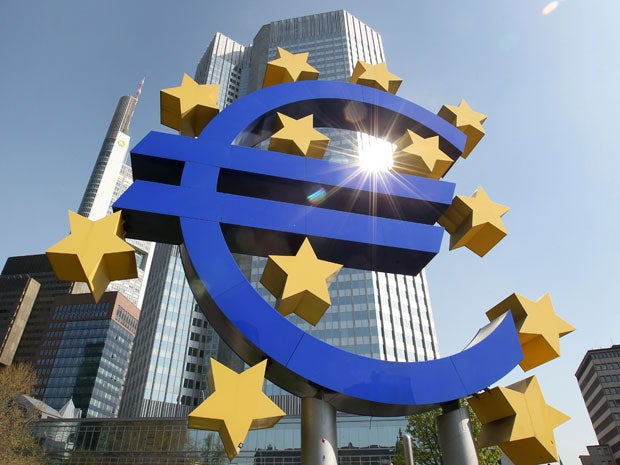
Your support helps us to tell the story
From reproductive rights to climate change to Big Tech, The Independent is on the ground when the story is developing. Whether it's investigating the financials of Elon Musk's pro-Trump PAC or producing our latest documentary, 'The A Word', which shines a light on the American women fighting for reproductive rights, we know how important it is to parse out the facts from the messaging.
At such a critical moment in US history, we need reporters on the ground. Your donation allows us to keep sending journalists to speak to both sides of the story.
The Independent is trusted by Americans across the entire political spectrum. And unlike many other quality news outlets, we choose not to lock Americans out of our reporting and analysis with paywalls. We believe quality journalism should be available to everyone, paid for by those who can afford it.
Your support makes all the difference.Fears surrounding the stability of the eurozone - particularly the state of Spain's financial system and whether Greece might be forced out of the single currency union - pushed global markets down again today.
Greece has called another round of elections for 17 June after the last one proved inconclusive and coalition talks to form a government fell apart. Greeks gave strong support to parties that reject the country's international bailout and the tough austerity measures it comes with.
But without that rescue package, Greece will likely default and have to leave the eurozone. That would result in financial disaster for Greece and send shockwaves through European markets, destabilising other weak countries.
As a result, the new elections are shaping up as a referendum on whether Greeks want their country to stay in the eurozone or not.
"The recent political paralysis has now brought Greece to what could prove to be the worst stage of its crisis," said Athanasios Vamvakidis, an analyst at Bank of America Merrill Lynch. "Although polls in Greece show very strong support for the euro, we believe that the current situation could trigger a chain of events that could lead Greece to exit on its own."
Adding to losses over the past two weeks, the FTSE 100 closed down 1.2 per cent to 5,338.38 while Germany's DAX fell 1.2 per cent to 6,308.96 and France's CAC-40 lost 1.2 per cent to 3,011.99.
Spain's Ibex saw one of the sharpest drops, but recovered somewhat to close 0.9 per cent lower, as investors fear the country would be the most destabilised by a Greek exit from the euro. A local report that depositors were drawing money out of the country's fourth-largest bank, Bankia, sent shares in the now-nationalised lender down 14.1 per cent and accelerated the Spanish bourse's fall.
Spain's bond yields were also high, edging up to 6.29 per cent for the 10-year note, an indication investors are worried about the country's financial future. The concern is that if Spain has to rescue any more of its banks, its government finances may be overwhelmed, forcing it to take a bailout of its own.
On Wall Street, stocks fell despite relatively upbeat economic indicators from the US this week. The Dow Jones industrial average dropped 0.5 per cent to 12,533.61 while the S&P 500 fell 0.7 per cent to 1,315.79.
Concerns about Europe's crisis offset any cheer from a US Labour Department report showing applications for US unemployment benefits held steady last week, a sign layoffs are not increasing, and news that Wal-Mart's income rose more than expected in the first quarter.
AP
Join our commenting forum
Join thought-provoking conversations, follow other Independent readers and see their replies
Comments